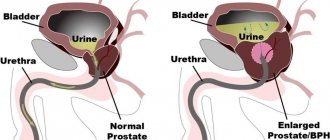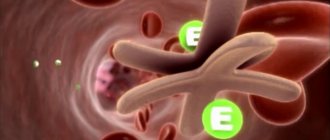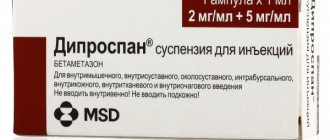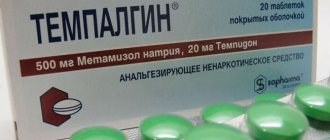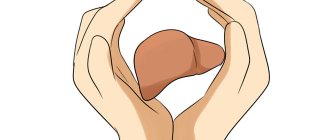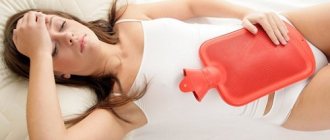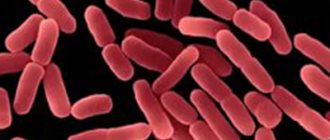Cystitis is an inflammatory pathology of the genitourinary system, which affects the wall of the bladder. The disease disrupts the usual way of life, as the patient not only feels pain and discomfort, but also becomes dependent on the toilet. Before you find out the symptoms of cystitis in men, you need to understand that it can be infectious and non-infectious in nature.
In representatives of the stronger sex, pathology is less common than in women. The risk of its development increases with a decrease in immunity and with the penetration of pathogenic microflora into the bladder in large quantities.
Types of cystitis
Inflammation of the bladder in the stronger sex is most often caused by 2 types of infection:
- specific or sexually transmitted infection;
- nonspecific, represented by simple bacteria.
The most common form of the disease is infectious cystitis in men.
It is caused by pathogenic microorganisms and develops against the background of other diseases: inflammation of the prostate, urethra, testicle, seminal vesicle, epididymis. Among the main causative agents of cystitis, the primary role is given to Escherichia coli. The next most common are Proteus, Klebsiella, and Staphylococcus. Less commonly, inflammation is caused by herpes viruses, influenza viruses, and human papillomavirus. In some cases, the causative agent is a fungus of the genus Candida. Then candidal cystitis in men is diagnosed. Its predecessor is candidal urethritis and balanoposthitis . The disease is transmitted sexually. Candida fungi grow a colony in the urethra and, under favorable conditions, rise higher into the bladder.
Specific forms of the disease are provoked by pathogens such as gonococci, chlamydia, mycoplasma, and trichomonas.
Infection can enter the bladder in several ways:
- rise from the urethra, testicle or prostate gland;
- descend from the kidneys with pyelonephritis and tuberculosis;
- penetrate from other foci of infection in the body.
Cystitis is also divided into primary and secondary. With a primary infection, inflammation begins immediately in the bladder. Secondary – when other neighboring organs (urethra, prostate) are inflamed and the process spreads to the bladder.
Chronicity of the disease most often occurs through the fault of the patient, when he himself decides what to take at the first signs of inflammation, as well as after self-treatment of urethritis and prostatitis. One of the chronic forms of the disease is interstitial cystitis in men, called painful bladder syndrome. In this case, the walls of the tank are damaged, scars appear and its capacity decreases. Interstitial cystitis is most often diagnosed in women - 90% and 10% of all affected men.
According to the prevalence of inflammation
Inflammation of the bladder in men is classified according to the prevalence of infection: cervical, total, focal. The most common inflammation of the bladder neck in men, which is divided into acute or chronic cervical cystitis.
The place where the bladder connects to the urethra is called the neck. It is surrounded by strong muscles (sphincters). The muscles relax and contract, which allows urine to pass out. With cervical cystitis, the muscles of the neck become inflamed. They lose their ability to hold urine, which can lead to leakage and, in complex forms, incontinence.
How to treat cystitis in men
Since cystitis is caused by bacteria, antibiotics must be taken to combat these pathogens. A doctor must prescribe antimicrobial drugs to avoid the possibility of allergic reactions and side effects. In addition to them, antispasmodics and drugs that eliminate inflammation are needed to relieve a person from severe pain.
Antibiotics for bladder inflammation
- Monural is an antibiotic used in urology.
Medicine for cystitis in men should be used for:
- bacterial cystitis in acute form;
- the presence of infections in the urinary tract after surgery;
- periodic recurrence of acute cystitis;
- prevention of infections during surgery.
Available in granule form. The main active ingredient of the drug is fosfomycin. The product has a destructive effect on bacterial cell walls. It is forbidden to drink Monural to patients with severe renal failure, children under 5 years of age, and those who have allergic reactions to this medicine. Adults need to take the drug for 1 day, the dosage is 3 g. The medication granules should be diluted with water in the amount of 1/3 cup, drinking 60 minutes before eating or after it at the same interval.
- Cyston is a homeopathic medicine that has an anti-inflammatory effect.
The drug contains:
- stemmed double-carp;
- madder;
- reed saxifrage;
- vernia ashy;
- Onosma bracts;
- rough strawflower;
- filmy wart;
- fragrant basil;
- peeled mumiyo;
- lime silicate;
- fava beans;
- horsetail;
- aromatic pavonia;
- yellow mimosa;
- teak wood seeds.
When to take: for inflammatory processes in the bladder; if urolithiasis is detected; for the treatment of gout and crystalluria. Medication dosage: 2 tablets twice a day. The action of the medicine for cystitis in men is antimicrobial, antispasmodic, litholic, anti-inflammatory.
- Nolitsin belongs to antibacterial drugs that show results in eliminating cystitis.
The following diseases may be the reasons for taking the drug:
- urethritis;
- pyelonephritis;
- prostatitis (bacterial and chronic);
- cystitis;
- gonorrhea that occurs without complications;
- cervicitis;
- endometritis;
- prevention of relapse of infectious diseases.
The medicine has contraindications:
- allergic reactions to the active substance (norfloxacin) and other components;
- age up to 18 years.
Dosage regimen for cystitis in men: 0.4 g twice a day. The course of treatment is 3-5 days. An overdose may result in nausea, vomiting, loose stool, drowsiness, facial swelling, and convulsions. Nolitsin has an impressive list of side effects that affect all body systems. Therefore, it is advisable to consult a doctor before use.
- Furadonin is an anti-cystitis tablet for men, the list of ingredients of which includes nitrofurantoin.
The drug Furamag has a similar effect. It is not recommended to use the medicine in cases of impaired renal function, liver cirrhosis, chronic hepatitis, porphyria, or heart failure. For men, the required amount of the drug is 50-100 mg at a time, you need to drink the medicine 4 times a day. It is recommended to be treated with Furadonin for a week.
Articles on the topic
- Omnik - instructions and mechanism of action, contraindications, side effects, dosage regimen and analogues
- Treatment of erectile dysfunction in older men - the most effective drugs, dietary supplements and physiotherapy
- Drugs that increase libido in women - medications and folk remedies, dietary supplements with prices, reviews
- Palin is an antiseptic used in urology. Contains pipemidic acid.
Suitable for the treatment of urethritis, pyelonephritis, cystitis and prostatitis. Medicine for cystitis in men has the following contraindications: porphyria, impaired functioning of the kidneys and liver, pregnancy and breastfeeding, allergies to the components of the drug, age less than 14 years, central nervous system diseases. You need to drink Palin 0.2 g 2 times a day before breakfast and dinner.
- Levomycetin, being an antibiotic designed to eliminate a wide range of types of bacteria, can have a therapeutic effect for cystitis.
Dosage regimen: 0.5 g 3-4 times/day. The drug has contraindications:
- liver diseases that impair its functioning;
- psoriasis;
- eczema;
- skin ailments caused by fungi;
- pregnancy and breastfeeding period.
Causes
In men, the causes of inflammation are associated with factors such as:
- sexually transmitted infections;
- kidney disease (pyelonephritis, urolithiasis);
- disturbance of urine outflow;
- instrumental interventions;
- abnormal development of the urinary system.
One of the main causes of the disease is the penetration of sexually transmitted infections. They first affect the urethra (urethra), gradually moving higher up the canal and affecting the bladder.
Impaired urination may be associated with the presence of stones in the urinary tract, purulent inflammation of the kidneys, tumors, prostate adenoma, the formation of an additional cavity in the urinary tract (diverticula), or narrowing of the urethra.
Other drugs against cystitis
In addition to taking antibiotics, herbal medicines are often used in the course of complex therapy.
Canephron helps to quickly relieve the symptoms of cystitis - this is a medicine with herbal ingredients that contains extracts of rosemary and centaury.
Phytolysin is often prescribed, which is also useful for eliminating pyelonephritis. The active ingredients included in Phytolysin help not only relieve pain, but also disinfect the bladder cavity.
To increase the outflow of urine, decoctions of chamomile and other medicinal plants with antiseptic properties, for example, bearberry, St. John's wort, lingonberry, and cornflower, are sometimes prescribed.
They are usually available in the form of dry tea bags, but there are also tablets with compressed herbal ingredients.
To relieve bladder spasms and reduce pain, you can use No-shpu or Papaverine. These remedies are very effective in reducing unpleasant symptoms, but antibiotics play the main role in treatment.
A drug such as Cyston is rarely prescribed for cystitis, since its main effect is directed against kidney disease. To treat male cystitis, it is often necessary to improve the functioning of the prostate gland and eliminate the narrowing of the urethra due to its enlargement.
The urologist must conduct a complete examination of the patient’s genitourinary system.
Symptoms
Inflammation of the bladder is considered more of a female disease, therefore, when certain discomfort occurs when urinating, the question arises whether cystitis occurs in men. Lower urinary tract infection does not occur often, but is characterized by the same symptoms as in women.
The first signs of how cystitis manifests itself in men:
- frequent urination, including at night up to several times per hour;
- burning, itching when urinating;
- sudden and irresistible urge to go to the toilet;
- urination requires effort;
- bladder pain in men;
- incontinence;
- decrease in diuresis (single portion of urine);
- cloudy urine, mixed with blood and discharge.
In some cases, a person feels chills and develops a fever. Bladder pain in men occurs at the beginning and end of urination. It is accompanied by sensations of cutting and burning. Pain manifests itself periodically or regularly in the groin, pubic area, and penis. Typical symptoms also include the presence of pus and traces of blood in the urine.
With the development of severe forms of the disease (hemorrhagic cystitis, gangrene of the bladder, purulent lesions of the submucosal layer), there is a high temperature, a sharp decrease in diuresis, turbidity and mucous particles in the urine, and an unpleasant odor. Candidal cystitis in men is additionally manifested by purulent, creamy discharge from the urethra and itching in the genital area.
In the chronic form, the symptoms of bladder inflammation in men are erased. They can be constant or appear cyclically. The urge to go to the toilet is not as frequent and painful, although tests in the urine confirm the presence of protein, leukocytes, red blood cells and mucus.
Measures to prevent cystitis
The cornerstone in preventing cystitis is a healthy lifestyle. It has been found that men who avoid casual intimate relationships, do not change sexual partners and do not drink alcohol are several times less likely to experience inflammation in the bladder.
Also, to prevent cystitis, you must follow the following rules:
- do not self-medicate, especially when taking antibiotics;
- observe the rules of intimate hygiene;
- monitor the quality of food consumed;
- treat infectious diseases promptly and completely;
- protect yourself from hypothermia.
Differences between cystitis and prostatitis
Prostate disease is not only a problem for older people. According to statistics, prostatitis is one of the most common urological diseases at the age of 30-45 years and can occur even in young men. Often prostatitis and cystitis occur simultaneously; more precisely, inflammation of the bladder is a complication of prostatitis. When the prostate gland is affected, the symptoms are very similar to inflammation of the bladder:
- frequent urination, sometimes accompanied by pain;
- in some cases, urinary retention, sluggish stream.
There are no pain receptors in the prostate, so pain is the result of the involvement of nerve fibers in the inflammatory process. Disorder of urination is due to the fact that the inflamed prostate increases in size and compresses the ureter. Hence the sluggish stream and the feeling of incomplete emptying.
However, there are characteristic signs of how to distinguish cystitis from acute prostatitis.
Manifestations of prostatitis are characterized by a certain picture:
- pain in the perineum, sometimes radiating to the anus;
- difficulty defecating;
- Temperature with cystitis in men is rare; with prostatitis it can remain constant in the range of 37 -37.9 degrees or rise to 40;
- often acute urinary retention.
The symptoms of chronic prostatitis are vague. They manifest themselves as mild pain and discomfort during a visit to the toilet. A companion to prostate inflammation are sexual disorders: deterioration of erection, accelerated ejaculation, refusal of sexual activity due to pain.
Forms of chronic cystitis
Chronic cystitis is divided into primary and secondary. The primary form of the disease appears on its own, regardless of other pathologies. Its causes include trauma, exposure to radiation, infection from the external environment, and parasitic diseases. Secondary cystitis is a consequence of stones, tumors, foreign bodies, prostate adenoma, and urethral obstruction.
According to the form of its occurrence, chronic cystitis is divided into 3 groups:
- Latent. Symptoms of the disease are invisible. The disease can only be detected through diagnosis. Exacerbation occurs up to 2 times during the year.
- Persistent. Exacerbation occurs more than 2 times a year. Laboratory tests and instrumental examination can diagnose inflammation.
- Interstitial. The most severe form of the disease. Exacerbation occurs frequently, the pathology of the bladder walls progresses, and the patient complains of constant pain.
Which doctor should I go to?
When the first symptoms of bladder inflammation appear, you should undergo a comprehensive examination by a urologist. Only this doctor can treat inflammation of the bladder in both men and women. The first thing the doctor does is rule out the presence of other diseases: prostatitis, inflammation of the testicle, narrowness of the foreskin. To do this, he examines, palpates and examines the prostate gland through the rectum.
If the cause of the disease is associated with sexually transmitted infection, then examination and diagnosis by a venereologist is mandatory. And based on the results of the examination and tests, it will be determined which tablets for cystitis to use in the presence of sexually transmitted diseases.
Prevention measures
Cystitis rarely affects men, but this does not mean that it cannot develop in a person with reduced immunity. Cystitis can be avoided by following these preventive measures:
- Maintain personal hygiene and change underwear daily.
- Always use protection during sexual intercourse, especially if it occurs with unstable partners.
- Contact a nephrologist or urologist immediately if signs of inflammation of the kidneys or other internal organs appear.
- Avoid stagnation of urine (visit the toilet every 3 hours).
In women, the disease is milder. If you carry out treatment on time, competently and correctly follow the recommendations of doctors, then both the fair sex and men will be able to completely get rid of the pathology.
Diagnostics
If there are obvious signs of infection, bacterial culture of urine and a smear taken from the urethra is prescribed. This analysis allows us to identify the causative agent of the disease. The second most important thing is scraping of epithelial cells, which makes it possible to determine DNA fragments of a specific pathogen, be it bacteria, fungi or viruses. This must be done to exclude sexually transmitted infections. How to treat cystitis in men depends on determining the type of infection.
A general urine test shows the presence of protein, blood and mucus in the urine. A urodynamic study is carried out to assess the patency of the urethra and the muscle tone of the bladder.
Acute cystitis in men does not make it possible to conduct an ultrasound of the bladder, since frequent urination does not allow urine to accumulate in the required volume. In this case, an ultrasound examination of the prostate is prescribed to determine residual urine and kidneys to identify complications and changes in the urinary tract.
If blood clots are visible in the urine with the naked eye and the disease has become chronic, the inner surface of the bladder is examined using an endoscope. The method allows you to identify tumors, stones, foreign bodies, sources of pus and bleeding.
Possible complications
Inflammation of the bladder against the background of prostatitis, urethritis and other urological diseases is fraught with complications. In half of the cases, indolent cystitis leads to decreased fertility and infertility.
Possible consequences of cystitis in men:
- sclerotic changes in the lesions;
- erectile dysfunction;
- paracystitis (inflammation of fatty tissue around the bladder);
- reducing the volume of the bubble;
- pyelonephritis.
With an infectious lesion of the urinary organs, the risk of bacteria entering the systemic bloodstream increases, which leads to sepsis - blood poisoning.
Treatment options
The first thing treatment for cystitis in men is aimed at is eliminating the causes of inflammation. The main task is to eliminate the pathogen in the man’s body. For this purpose, antibacterial drugs are prescribed. How long the inflammation is treated depends on the number of microorganisms and the degree of damage to the bladder mucosa.
To relieve symptoms (redness, soreness), non-steroidal anti-inflammatory drugs in tablets are prescribed: Baralgin, Diclofenac.
Recently, immune drugs for cystitis in men are often prescribed. The most common remedy for cystitis is Uro-Vaxom. It is designed specifically to boost the immunity of the urinary system. It is prescribed in conjunction with antibiotics and as a prevention of relapses.
To remove bacteria from the urinary reservoir, diuretic medications are prescribed to treat cystitis in men.
Pain syndrome is eliminated with painkillers and antispasmodics in the form of tablets and injections. No-shpa is often prescribed. This is a fast-acting medicine that reduces muscle spasm and promotes normal bladder emptying.
The period for which cystitis in men is treated depends on the causes of its occurrence and the presence of other diseases. However, the average course of antibiotic treatment is 10 to 20 days. Other tablets for cystitis in men should be taken for at least 20 days, i.e. as much as taking antibacterial agents. Symptoms disappear, and treatment in men becomes effective only with an integrated approach. To cure inflammation, you need to stay in bed, drink more fluids (still water, fruit drinks with cranberries and lingonberries), and abstain from intimacy.
The latest remedies for cystitis
The latest achievement in pharmacology is considered to be a new form of drug release in granules that dissolve in water. If the word “Solyutab” appears on the package, we are talking about these tablets. This development allows you to increase the bioavailability of the product, as well as use it at any time. One of these drugs is Ceforal - it is a very powerful and fast-acting antibiotic. However, the most popular medicine is Monural. This remedy has the fewest contraindications; even pregnant women can take it.
Thanks to rapid absorption, it immediately enters the urinary system, where it begins to destroy pathogenic microorganisms like a professional bacteria killer. Just one tablet of Monural makes urination painless and relieves most of the unpleasant symptoms of cystitis. Some antibiotics are taken at the same time, for example, Monural and Furagin. Some should not be taken at the same time because they could potentially cause negative drug interactions.
All the nuances of the compatibility of medications should be clarified by the urologist who is preparing the course of treatment. While taking antibiotics, you should refrain from drinking alcohol, even beer, even on Friday, even in small quantities. Uncomplicated cystitis can be treated in less than a week, and if the man does not suffer from alcoholism, abstaining from alcohol during this short period of time should not be a problem.
During the acute phase, you cannot apply hot compresses or heating pads to your stomach, you cannot visit the bathhouse or sauna, or take a very hot bath.
Even after starting antibiotics, you need to wait for a stable improvement in the condition, then consult with your doctor, and, if he does not object, begin warming procedures.
Other treatments
In combination with taking medications, cystitis can be treated with the following methods:
- Phytotherapy. A mandatory basis for successful treatment is the use of plant-based drinks that have a diuretic effect. This will facilitate the rapid leaching of microorganisms. Teas based on horsetail, bearberry, and lingonberry will be especially useful. Cranberries have proven themselves to be excellent and are taken in the form of fruit drinks and compotes. If it is not possible to prepare drinks yourself, you can buy tablets based on these plants at the pharmacy (Monurel, Canephron, Cyston). It is not worthwhile to be treated only with herbal medicines, since they do not act immediately: the positive effect can only be felt with long-term use.
- Rinsing the urea. It is carried out in case of accumulation of pus, stagnation of urine and the need to remove the infection. Using a special catheter, antiseptic medications are infused into the bladder through the urethra or blockades are carried out with novocaine in case of severe pain.
- Physiotherapy. They are carried out only in a state of remission; electrophoresis, UHF, ultrasound, mud therapy, and magnetic therapy can be prescribed.
- Sanatorium treatment. In the remission stage, it is advisable for patients to undergo preventive therapy in sanatoriums 2 times a year. It is necessary to select a sanatorium that directly specializes in urological diseases. Mud therapy procedures will be especially useful.
Also during treatment, bed rest, drinking plenty of fluids and following a special diet are recommended, the products of which will not irritate the walls of the bladder.
Classification
Cystitis in men can be classified according to various criteria. If we consider it from the point of view of the characteristics of the course, the following types of disease are distinguished:
- Spicy. It is characterized by vivid symptoms. A full course of therapy helps to quickly restore health. The manifestation of acute cystitis in men can recur annually. This indicates the patient’s failure to comply with basic prevention rules.
- Chronic. It develops in cases where the acute phase of the disease is not treated or the wrong treatment method is used. In some cases it may be asymptomatic. Chronic cystitis in men is characterized by periods of exacerbation. They can happen up to three times a year.
The disease is classified not only by how cystitis manifests itself, but also by the area of localization of the inflammatory process. The infection may be concentrated in the area of the bladder neck or bladder triangle. In severe cases, the entire wall of the organ is involved in the process. This disease is called diffuse cystitis.
What can be dangerous about chronic cystitis?
Chronic cystitis is more difficult to treat than acute cystitis. You need to carefully consider all doctor’s prescriptions. After all, advanced chronic inflammation in the genitourinary organs is extremely dangerous for men’s health.
Prostate diseases may occur. Cystitis, of course, does not directly cause prostate disease, but with chronic inflammation, immunity drops sharply. Against the background of a weakened immune system, prostate diseases are often activated. And with chronic diseases of the genitourinary system, impotence often occurs.
Chronic inflammation is prone to frequent exacerbations. Over time, relapses of the disease occur even with slight hypothermia. The disease in its advanced form does not always respond to conservative treatment methods; sometimes it is necessary to resort to surgical intervention. The infection can travel up the ureters and cause pyelonephritis. From too frequent urination, the walls of the bladder are gradually deformed, and pathology of the walls sometimes leads to cancer.
Often, during inflammation, urine is thrown back into the kidneys and ureters. Bladder perforation may occur.
Traditional methods and prevention
Following simple recommendations will help prevent the development or recurrence of pathology:
- Avoid prolonged constipation.
- Maintain personal hygiene.
- Use condoms during sexual intercourse.
- Avoid local and general hypothermia.
- Do not wear tight underwear made of synthetic fabrics.
- Do not allow urine to stagnate.
When the first, even minor symptoms appear, immediately contact a urologist so that he can conduct a full examination, make a correct diagnosis and prescribe adequate treatment.
Not everyone is suitable for treatment. In many cases, traditional methods are used in complex therapy.
- enhance the effect of tablets;
- increase immunity;
- achieve recovery faster.
Folk remedies are excellent for complex therapy and for disease prevention. Medicines should not be neglected. For cystitis, the attending physician selects effective combinations of infusions and medications.
- Drink 200 ml of flax seed tincture before meals. The infusion is prepared as follows: a large tablespoon of seeds is required for 200 ml of water. Boil for no more than five minutes. Leave for 10 minutes. You can add a spoonful of honey to the prepared infusion. Drink slowly, intermittently, so that you drink it within an hour. It can be used if a chronic process develops.
- For chronic inflammation of the bladder, treat it with cranberry juice. It relieves inflammation and has antibacterial effects. But you should not drink it if you have problems in the gastrointestinal tract.
- For severe pain during urination, you can use millet infusion. Millet is poured with water overnight at the rate of one part millet and 3 parts water. Strain the infusion. Drink no more than four times a day for seven days.
- Pumpkin seeds give a good effect. They cleanse the urinary tract well. You need to eat half a glass a day. It's better not to fry them.
To avoid problems with the bladder, you need to avoid hypothermia, watch your diet, do not drink alcohol, drink 2 liters of water a day, maintain hygiene, go to the toilet when you have the urge to urinate, and do not cause inflammation. Treat them in a timely manner. You also need to visit the urologist's office more often.
Medicines for the treatment of male cystitis
Drug therapy can be etiotropic or symptomatic. Etiotropic therapy is aimed at counteracting pathogenic organisms - the causative agents of the disease. The goal of symptomatic treatment is to relieve unpleasant symptoms - pain and spasm.
If the cause of the disease is a bacterial infection, then a course of antibiotics is necessary. The most commonly used drugs are fluoroquinolones (such as lomefloxacin, ofloxacin, gatifloxacin, ciprofloxacin), nitrofurans, cephalosporins, and less commonly penicillins. The duration of treatment is usually a week.
Before choosing an antibiotic treatment regimen, it is necessary to conduct research on the type of pathogen and its resistance to antibiotics.
Preparations with herbal anti-inflammatory and antibacterial components are also often used, such as Canephron, Phytolysin, Monurel, Urocam, Uroflux, Urolesan, Cyston, bearberry herb, horsetail and St. John's wort decoction.
Another class of drugs used for the disease are antispasmodics (papaverine, drotaverine), which help relieve spasms and the pain syndrome caused by them. NSAIDs are also used to reduce symptoms of pain and inflammation. For severe pain, novocaine blockades are used. It is also recommended to take vitamins to increase the body's resistance to infection.
Types of Medicines Used for Cystitis
| Type | Purpose | Examples |
| Antibiotics | Fighting bacterial infection | ciprofloxacin, amoxicillin/clavulanic acid, tetracycline |
| Herbal preparations | Anti-inflammatory, antiseptic effect | Monurel, Canephron |
| Antispasmodics | reduction of pain and spasms | drotaverine |
| NSAIDs | fight pain and inflammation | Ibuprofen |
As a rule, quick treatment of cystitis in men with tablets depends on how responsibly the patient took his health and sought help from a specialist. In the early stages of the disease, it is enough to undergo a short course of drug therapy and take preventive measures. As a quick and effective drug therapy, the doctor prescribes single-dose antibiotics, such as Monural (an antibiotic) and its analogues. However, in an advanced stage, it will not be possible to achieve results in one day, and you will have to undergo treatment for a long time.
Often, patients do not have the opportunity to purchase expensive medications because their financial capabilities are limited. In such cases, when prescribing how to treat cystitis in men, experts offer inexpensive tablets with a wide spectrum of action. As a rule, they differ from their expensive counterparts only in the country of origin, and in some cases, in auxiliary components. It is worth noting that inexpensive medicines are no less effective than imported ones.
Hyperactivity syndrome
This disorder should be classified as a separate subgroup of diseases caused by a disorder of the nervous system. The essence of this pathology is an increase in activity, an excessively increased functional capacity of a given organ.
An interesting fact is that this bladder disease in men does not cause as much pain as the other disorders described above. But in this situation, physical discomfort is replaced by psychological discomfort - the patient loses the ability to hold back urine, and the frequency of urge increases significantly. As a result, a phenomenon called urine leakage is observed, which causes a number of psychological problems in the patient.
Hyperactivity syndrome in representatives of the stronger sex occurs against the background of the following disorders:
- spinal column trauma;
- circulatory disorders in the organ;
- decreased functional ability of the bladder muscles caused by age-related changes;
- damage to the spinal cord or its canals.
To completely cure such an ailment, it is necessary to completely eliminate the cause that provoked its occurrence.
For symptoms of hyperactivity, medications are prescribed to help reduce discomfort and the amount of urine produced. The functioning of the muscular system can be normalized by using special exercises (Kegel gymnastics). The patient is also required to receive psychological assistance.
Making an accurate diagnosis
Symptoms of cystitis in men can be similar to manifestations of other diseases, which is why it is important to consult a doctor in a timely manner. An accurate diagnosis can only be made after undergoing a full medical examination. The following diagnostic techniques are used:
- History taking and examination. The doctor identifies the presence of factors that provoked the development of the disease and characteristic symptoms. Palpation of the genital organs is performed, as well as digital examination of the prostate.
- General urine analysis. The level of leukocytes, the presence of blood, mucus and bacteria are determined.
- Blood test. The severity of the disease can be judged by the level of eosinophils and leukocytes. The ESR must be determined, which increases in the presence of an inflammatory process in the body.
- Bacteriological culture. A smear taken from the urethral area is placed in a nutrient medium. After some time, a colony of bacteria forms in it. This allows not only to identify the pathogen, but also to conduct additional research on its sensitivity to the active ingredients of modern medications.
- Polymerase chain reaction. Examination of a patient’s biological material using this technique allows one to detect the presence of a sexually transmitted infection.
- Uroflowmetry. This diagnosis allows you to identify the presence of problems with urination.
- Ultrasound of the kidneys and prostate. This examination helps to assess the condition of organs and identify pathological changes in them.
The doctor analyzes all the research results, as well as all the symptoms that appear, and prescribes treatment for cystitis in the man. The patient can only strictly follow all instructions.
Dietary recommendations
In the acute period of the disease, treatment of cystitis in men, for which medications are a mandatory component, requires bed rest, the use of antipyretics, drinking plenty of fluids (about 2.5 liters per day), following a diet avoiding sour, salty and spicy foods, as well as alcohol.
It is recommended to include foods that have a diuretic effect in your diet. These are melon, watermelon, cranberries, pumpkin, cucumbers. Low-fat cottage cheese, milk, unsalted cheese, whole grain bread, and bran are allowed.
Causes of inflammation
Dysfunction of the genitourinary system is always accompanied by the appearance of corresponding clinical symptoms, which appear so clearly that it is extremely difficult to confuse them with signs of other diseases of the genitourinary tract. The development of bladder diseases is often caused by the patient becoming infected with sexually transmitted pathologies, which require timely and urgent treatment. It is not uncommon for older men to experience some prostate health problems. Therefore, the cause of disruption of the functioning of the urinary organs in this case may be an extensive tumor process occurring in the prostate gland.
The cause of symptoms of these ailments in representatives of the stronger sex in most situations are the following factors:
- chronic diseases of the digestive system;
- decreased immune defense;
- drinking alcohol or drugs, smoking, eating fatty, fried, spicy foods;
- severe hypothermia of the body (especially the groin area);
- trauma to the spinal canal;
- violation of personal hygiene standards;
- low physical activity during the day;
- penetration of infectious pathogens into the organ;
- tight, incorrectly selected underwear;
- physiological changes associated with age;
- congenital anomalies in the structure of the urethra, changes in the physiological structure of the bladder;
- foreign bodies entering the bladder;
- various inflammations of the urogenital zone and infections of other organs and systems.
